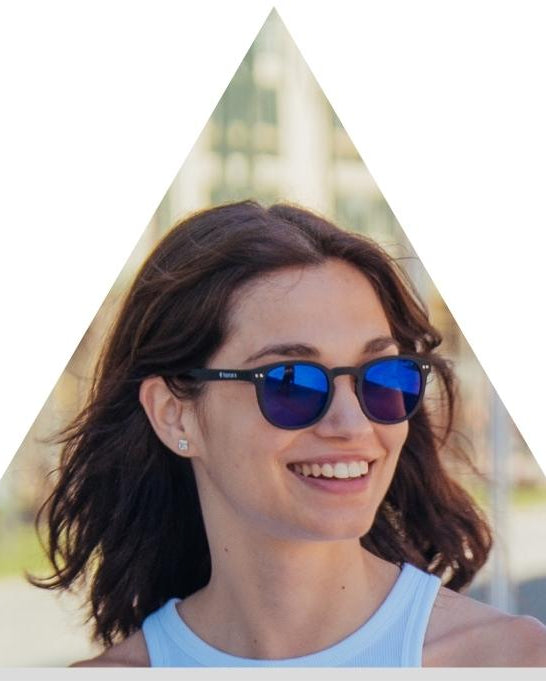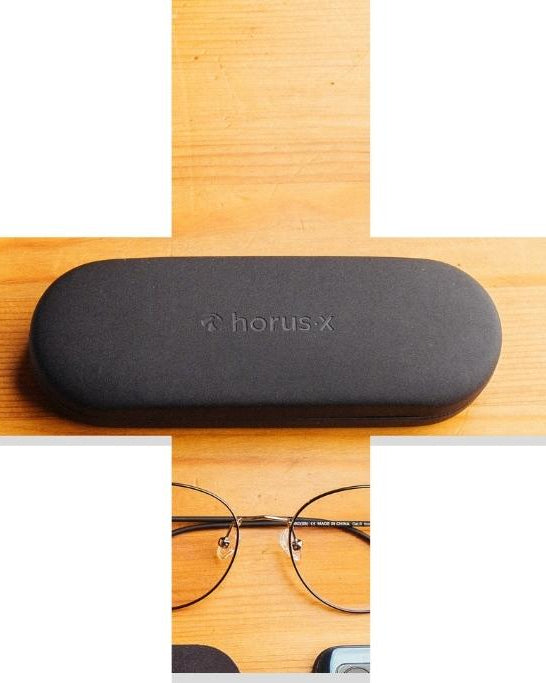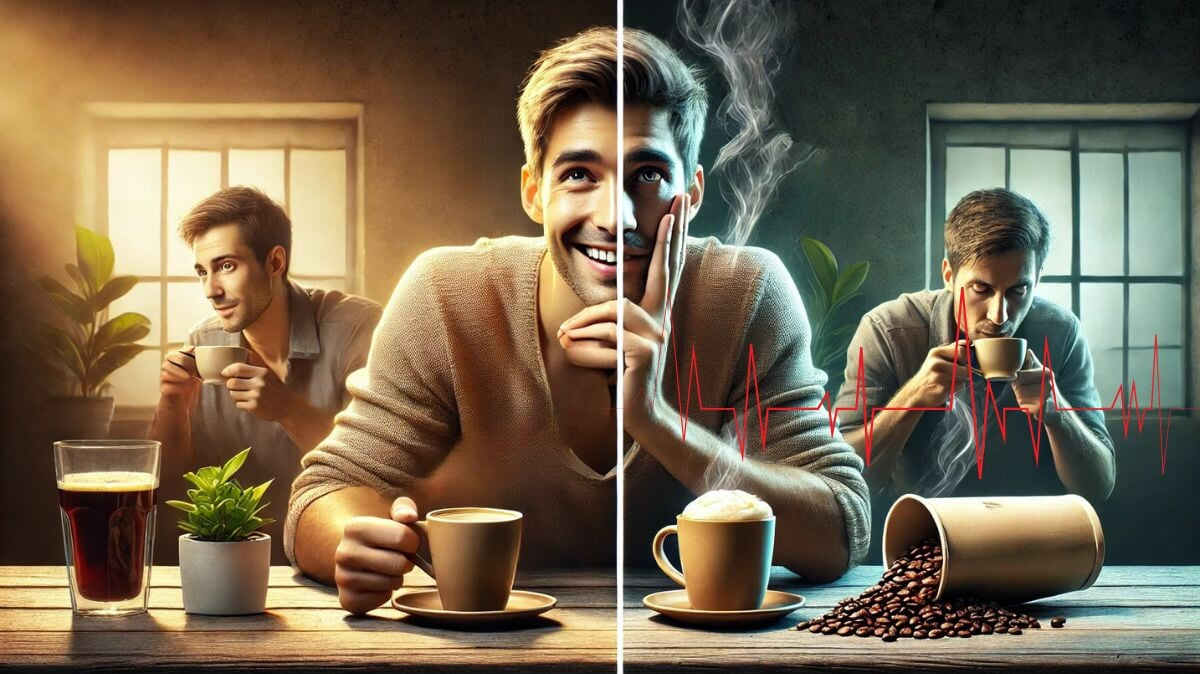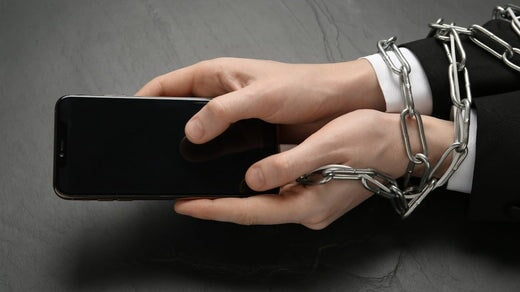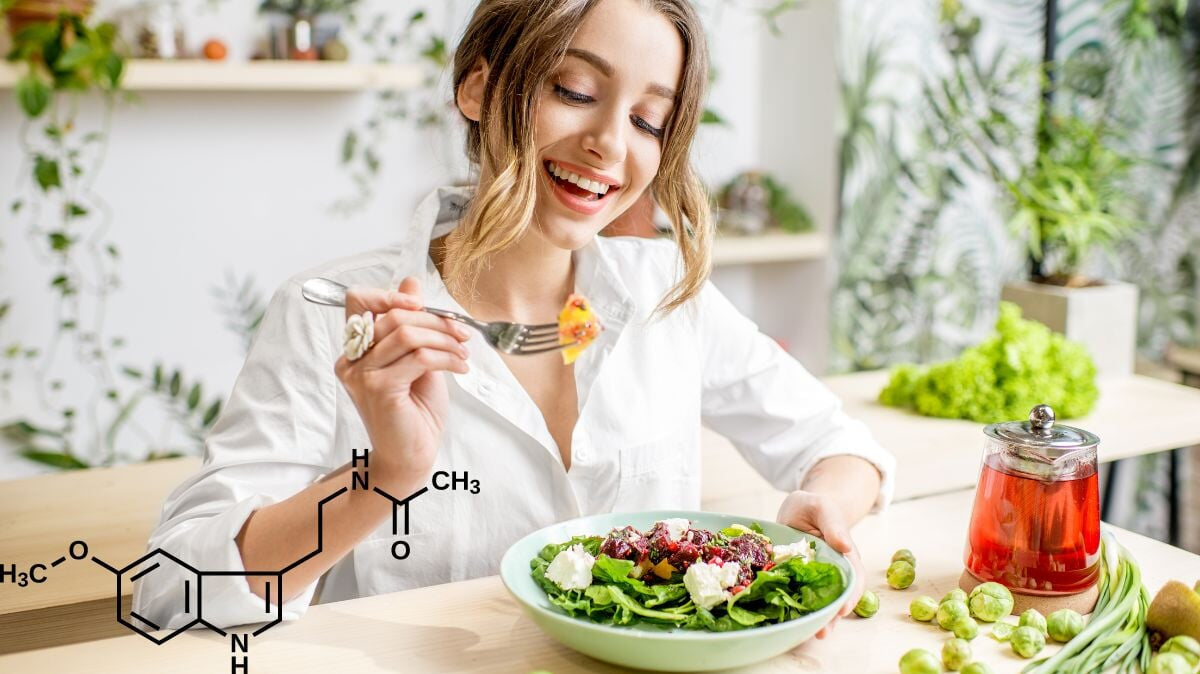Did you know your diet impacts your sleep pattern and quality?
If you ate a four-cheese pizza 3 hours before bed and you’ve then spent hours lying there uncomfortably full, then this article is for you.
Learn what foods are good for sleep and what to avoid at the dinner table.
What’s the link between food and sleep?

Diet plays an essential role in falling and staying asleep.
Throughout the day your brain releases different chemicals called hormones. Among them, serotonin (the happiness hormone) helps us regulate our mood and prepares us for sleep.
When night falls and there’s less light, serotonin is converted to melatonin instead. When released, melatonin regulates the sleep wake cycle and promotes falling asleep.
However, serotonin, and therefore melatonin’s levels are impacted by how much of the amino acid tryptophan is in your body. You can’t produce your own tryptophan, but it is found in certain foods.
That’s why the way you eat has a direct impact on how you sleep. It’s foods rich in tryptophan that produce serotonin and melatonin, allowing you to have a good nights sleep!
Foods high in tryptophan

The National Sleep Foundation has done studies on foods with high levels of tryptophan. These promote sleep and its recommended you incorporate them into your evening meal or have as a little snack before bed.
Luckily, tryptophan is found in almost all protein rich foods including:
- 🥚 Eggs
- 🐿️ Walnuts, almonds and hazelnuts
- 🥛 Dairy products
- 🍚 Some grains and cereals like rice, quinoa, oats, soy, corn, sesame and rye
- 🫘 Dried vegetables such as chickpeas, lentils and dried beans
- 🍗 Meat
- 🐟 Fish
- 🍌 Banana
- 🍫 Chocolate
Magnesium

Magnesium is an essential mineral for the human body and plays an important role in biological functions, including those related to sleep. It plays a key role in muscle relaxation, which naturally increases sleepiness.
It’s also an ally against stress thanks to its calming effect on the nervous system. However, if you’re suffering from a magnesium deficiency you might find yourself suffering from higher levels of stress and anxiety, naturally interfering with your ability to fall and stay asleep. Long term it can also cause various sleep problems and disorders like insomnia.
Magnesium-rich foods include:
- 🍫 Dark chocolate
- 🌽 Whole grains
- 🫛 Legumes
- 🥬 Spinach
- 🥜 Nuts
Omega 3 fatty acid

During the day, these fatty acids keep us fit and our brains working well, and at night they help us sleep like babies.
Just like magnesium, they contribute to the proper functioning of neurons and impact your internal clock. They also promote the production of melatonin and help reduce insomnia for improved sleep.
High levels of omega-3 can be found in:
- 🐟 Oily, fatty fish: salmon, sardines, trout, mackerel, sardines…
- 🌻 Rapeseed oil, linseed oil, walnut oil…
Vitamin B

Our diet should be rich in proteins, lipids and nutrients. Among these, Vitamin B affects the chemical balance of the brain. They regulate hormonal activity and participate, among other things, in the transformation of tryptophan into serotonin and melatonin.
The best foods for Vitamin B include:
- 🥬 Leafy green vegetables: lettuce, spinach, chard, etc.
- 🌽 Whole grains
Starchy foods
- You can easily include a portion of starchy foods (rice, pasta, semolina, bread, potatoes, etc.)
- in your dinner to avoid nighttime cravings. They release energy slowly and help the production of serotonin, which I turn impacts melatonin, which in turn helps you get a healthy sleep.
Starchy foods include:
- 🍚 Rice
- 🍝 Pasta
- 🌾Semolina
- 🍞Bread
- 🥔Potatoes
Sugars

Sugar isn’t always bad, especially if you have a bit of a sweet tooth.
Sugary, sweet foods actually help you fall asleep as they induce drowsiness. But be careful, that doesn’t mean you can chow down on a giant bar of Hershey’s before bed, or stuff your face full of Haribo. Sugars need to be eaten in moderation as part of a well-balanced diet.
However, try to avoid fast releasing sugary foods during the day. Rather than the expected energy boost you might find yourself sleep instead.
Herbal teas

Drinking herbal tea can greatly contribute to a good night’s sleep, for several reasons.
The first, is that establishing a routine before bedtime signals tot your brain that your body is preparing for rest.
The second is down to the infusion you choose. Some herbal teas like valerian, chamomile, passionflower, verbena or even hawthorn flower have relaxing properties that aid falling asleep.
The last is that drinking a hot drink promotes a drop in internal temperature by triggering sweating, which will cool your entire body, something which naturally happens as you get ready to have a good sleep.
Foods that negatively impact sleep

Are you a fan of a good old apple pie or ice cream at the end of the evening? Not good unfortunately!
To reduce difficulties in falling asleep, you should limit your intake of:
🍕 Fatty foods: Do not eat large or heavy meals in the evening, as they increase body temperature when a lower temperature is more ideal for falling asleep. So, forget about pizza, burgers, cold cuts, chips, cakes and processed foods. Not only do they stimulate wakefulness, but they also contribute to the desire to eat.
☕ Coffee, tea, energy drinks and soft drinks: These stimulants contain caffeine and are particularly harmful to your quality of sleep. They can cause difficulty falling asleep and less deep sleep. The best time to drink your last coffee is long before bed. Late night chocolate won’t help either as it too contains caffeine.
🍺 Alcohol: Even though too much of it can be a great help in knocking you out, alcohol actually doesn’t promote deep and restful sleep. Any of us who have had a few too many will know what we mean. When you drink alcohol, you’re more likely to have a restless night and wake up often, have difficulty falling asleep, and suffer from a headache in the morning to top it all off.
even if three mojitos are enough to knock you out in two and a half seconds, alcohol does not at all Alcohol can also aggravate nocturnal breathing problems such as sleep apnea or snoring since it helps to relax muscles. So, limit it as much as possible!
🫚 Spices (curry, chili, ginger, etc.): Delicious though they may be, spicy foods are likely to cause heartburn which can lead to a sleep disorder like insomnia. You can always put a little pepper in your soup or cauliflower gratin but go easy on it!
Good eating habits for better sleep quality

❌ Don't skip dinner: During the night, your body needs energy to keep your muscles working, and to maintain a good body temperature. By depriving it of food, you disrupt these natural rhythms and increase your cortisol levels, making it harder to fall asleep.
🕖 Choose the right meal time: Don’t eat dinner too early, the brain needs to be sufficiently nourished during the REM sleep cycle to sleep well. But on the other hand, don’t eat too late either. This will increase your body temperature due to digestion, harming your ability to fall asleep. Ideally you should eat 2-3 hours before bed.
🎃 Choose the right snacks: if you ate dinner too early and you're feeling a little hungry when you're about to go to bed, avoid reaching for the packet of cookies from the supermarket. Instead, opt for a portion of nuts (almonds, pumpkin seeds), a yogurt or a banana, as that help you fall asleep.
🥗 Adopt a varied and balanced diet: You've heard it enough already, but avoid eating too much fat, too much sugar, and too much salt.
💧Keep hydrated: It’s recommended you drink 1.5litres of water per day.
📵 Bonus tip: Limit screen time in the evenings. Try to turn off screens at least an hour and a half before bed. Blue light from screens is highly disruptive to sleeping patterns as it blocks the production of melatonin, disrupting your circadian rhythm and therefore the quality of your sleep. To prevent this, reduce the use of screen as much as possible and equip yourself with our anti-blue light glasses to limit the damage.
What to eat to sleep better: Final thoughts
Sleep and nutrition are closely linked.
To get an early and prompt visit from the sandman, make sure to make the right food choices, especially at dinner time. Choose foods rich in tryptophan, magnesium, omega-3 and vitamin B.
Don't forget starchy foods to avoid late-night or nighttime cravings, and treat yourself to a little sugar (in moderation of course). But keep away from spice at night. You might like a spicy evening but see if you can get it elsewhere 👀
That’s all from us, just make sure to lay off the coffee and booze! Enjoy your sleep!



